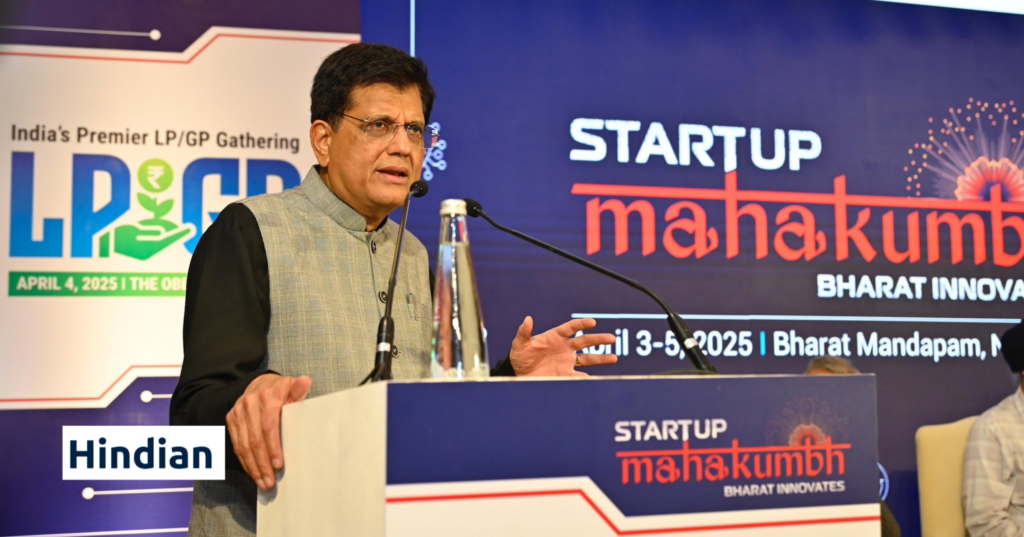India proudly holds the title of the world’s third-largest startup ecosystem. Events like the recent “Startup Mahakumbh” are hailed as celebrations of entrepreneurial success. But these spectacles conceal a harsh reality: India is mistaking motion for progress, applause for achievement, and scale for innovation. While global powers like China aggressively invest in artificial intelligence, robotics, and frontier technologies, India continues to churn out service-based apps and celebratory slogans.
This article critically examines India’s startup landscape, highlighting misplaced government priorities, a fixation on quick gains over meaningful innovation, and a culture that values pitch decks over pioneering breakthroughs.
• Quantity Without Quality: The Shallow Depth of India’s Startup Boom
India boasts over 50,000 startups, with unicorns emerging at a rapid pace. Yet, most of these ventures operate in the comfort zone of consumer convenience—delivery apps, digital astrology, online grocery platforms—mere adaptations of Western models with an Indian flavor.
Companies like Ola, Zomato, and Flipkart have achieved commercial success, but they don’t represent technological innovation—they represent market replication. In contrast, truly transformative ventures in fields like AI, quantum computing, or clean tech are scarce.
According to Nasscom, India had 3,600 deep tech startups in 2023, with only 480 new entrants that year. More concerning, deep tech funding plummeted by 77%, from $3.7 billion in 2022 to $850 million in 2023. The message is clear: India celebrates convenience, not complexity; valuation, not value.
• Government’s Role: Grand Events, Hollow Support
Startup India, tax incentives, and patent support sound promising on paper. But the ground reality tells a different story. The government’s focus appears skewed toward optics rather than outcomes. Events like the Startup Mahakumbh—with its 48,000 attendees and hundreds of speakers—may generate buzz, but they do little to address core structural issues.
India’s R&D investment stands at a dismal 0.7% of GDP, far below the global average of 2.63%. The 2024 National Deep Tech Startup Policy is a step in the right direction, but without robust execution and significant funding, it risks becoming yet another ceremonial initiative.
Commerce Minister Piyush Goyal’s 2025 call for deeper tech innovation was welcome but rings hollow without institutional backing, capital infusion, and regulatory clarity.
• Freebies Over Founders: A Nation’s Misplaced Priorities
While entrepreneurs struggle to secure seed capital for hardware and deep tech ventures, politicians are doling out freebies during elections, draining state budgets and sapping economic potential. In 2018, welfare schemes consumed ₹1.6 trillion, while R&D received just ₹1.13 trillion.
States like Andhra Pradesh spend over 2% of their GDP on populist schemes, prioritizing votes over value creation. Imagine if even 25% of that money was redirected to AI labs, space tech incubators, or semiconductor parks.
This populist addiction stifles entrepreneurship and delays India’s emergence as a global tech powerhouse. The result? A startup culture focused on valuations, not visions; exits, not excellence.
• Founders Playing It Safe: Apps, Not Ambition
The Indian startup community, too, must introspect. Too many founders chase quick exits instead of solving complex national or global challenges. Building one more payment gateway, one more grocery app, or one more aggregator platform does little to advance the country’s technological future.
The Flipkart-Walmart deal in 2018—though lucrative—epitomized the short-term mindset: build fast, scale quickly, exit early. Deep tech ventures like Skyroot Aerospace and ideaForge show what’s possible, but they remain exceptions in a sea of sameness.
As expert Venugopal Garre noted, India trails China significantly in strategic tech sectors—a gap that will widen unless our entrepreneurial culture shifts from convenience to courage, and from cloning to creation.
• The Way Forward: Build, Don’t Just Brand
India’s transformation into a tech superpower requires more than flashy expos and startup summits. It requires:
Raising R&D spending to at least 2% of GDP within five years.
Channeling funds from populist schemes into research grants and innovation hubs.
Creating regulatory ease for emerging sectors like AI, climate tech, biotech, and defense tech.
Fostering collaboration between academia, industry, and government.
Rewarding long-term innovation over short-term valuation.
Public discourse must evolve as well. We need to move beyond unicorn counts and seed round announcements, and start asking: What problems are we solving? What futures are we building?
• India Must Choose Substance Over Spectacle
Startup Mahakumbhs may inspire, but they cannot substitute real investment. India must stop clapping for pitch decks and start investing in possibilities. A nation that dreams of global leadership cannot afford to be distracted by apps while others develop algorithms, satellites, and quantum processors.
We don’t need more delivery apps—we need deliverables. We don’t need more slogans—we need systems. We don’t need more spectacles—we need strategy.
Until that shift occurs, India will remain a consumer of global technology, not a creator.
The future belongs to those who build it—not just those who brand it.



